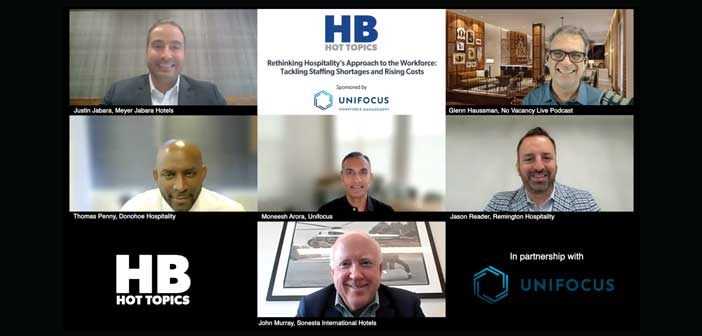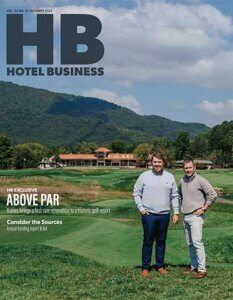Staffing has plagued hospitality for years and was made even worse by the pandemic. Industry leaders had to pivot just to stay afloat, but now, as travel stabilizes, hoteliers are finding creative ways to combat the labor struggle.
During the latest Hotel Business Hot Topics session, “Rethinking Hospitality’s Approach to the Workforce: Tackling Staffing Shortages and Rising Costs,” in partnership with Unifocus, optimism was a common thread among all the participants.
Glenn Haussman, founder/host, No Vacancy Live podcast, moderated the session, which featured Jason Reader, EVP, operations, Remington Hospitality; Justin Jabara, president, Meyer Jabara Hotels; Thomas Penny, president, Donohoe Hospitality; John Murray, president/CEO, Sonesta International Hotels; and Moneesh Arora, CEO, Unifocus.
“It’s a better [staffing]situation now than it was in the past year,” Reader said. “It seems when you go to markets that have dynamic general managers, do you ever notice how they don’t suffer from the same staffing shortages that the other hotels do? Of course, we can’t have that in every hotel, but it just goes to show that the culture piece and leadership really do matter.”
Although the industry is surely in a better place in 2023 than it was a few years back, more than 100,000 hotel-specific jobs are currently open in the U.S., according to the AHLA.
“We’re competing against many other industries,” Jabara noted. “It’s no longer about competing against other hotels. COVID leveled the playing field. As an organization, we have a strong culture, which is appealing, but what we’ve found is that you can’t hire someone just to be a room attendant. It’s about wanting that experience and culture working at that hotel.”
It’s also about managing today’s workforce. This means streamlining schedules and boosting probability and long-term property value in creative, efficient ways.
“A common theme we’re seeing is giving frontline managers and GMs the appropriate amount of time to spend with people on the recruiting and retention fronts and daily interactions,” Arora said. “It’s about freeing them up by taking the mundane but necessary tasks around scheduling and automating those and empowering employees to manage their own time.”
Something COVID taught, he said, was that people want control of their time. By having a hotel operator or GM give employees the time back is where he’s seeing hotels differentiate themselves in the market.
Creating culture
Employees, especially younger generations coming up through the workforce, also want to feel connected to their team members. To work alongside people who not only care about the guest but each other is especially important.
“Employees want to come work with people who are engaged and care about helping people—that’s the good thing about hospitality,” Murray said. “People get into the hospitality business because they care. We need to get them in the door… Hospitality is contagious.”
But that happens to be the greatest hurdle: getting passionate, motivated people in the door. So, how does hospitality attract these workers? Creating realistic pathways is key, especially for diverse groups, but also sharing success stories.
“People want the opportunity for growth, especially this generation; they don’t want to wait 20 years to become a GM,” Penny said. “We have to give them an accelerated track. Success stories spread throughout an organization. There are tremendous stories about how our industry is a low-floor, high-ceiling business. At a time when college tuition is not affordable, our industry is the industry where they can come in and make a great living and grow within our business. We have to continue to make certain folks are connected to these stories.”
Telling these stories and communicating the backbone of hospitality is something the industry must be more intentional about, the leaders agreed.
“The reality is that this is fun,” Reader said. “It’s not always fun—there are times when it’s tough—but, to me, when you think about what we’re trying to harness, it’s the spirit of service. It attracts a lot of people. The key for us is keep the culture going, internally promoting and giving people a career track. That’s where our industry has an advantage.”
It’s also about optimizing the human bodies in a hotel, which can ultimately ease the labor burden and even accelerate associates’ career paths.
Penny explained how some platforms allow employees to train online, and when they complete a module, it notifies their supervisors that they’re ready for the next job.
“It empowers team members and shows that they’re committed to learning,” he added. “We have more opportunities and vacancies at every level, and this expedites their ability to access those.”
Engagement is vital, Arora explained, coupled with surveying the workforce and publishing that information so others can see. This is an actionable item that shows employees that their concerns are being heard and their needs met.
“Sharing that across the organization, having transparency, sharing goals and those types of things really unite people around the world, and will hold you accountable to your values,” he said. “That, to me, is how you bring everything together and make sure we’re doing that internally.”
Being heard is an often-overlooked need, but one that leaders can fulfill rather easily. Jabara explained that leadership at his company takes full responsibility when employees aren’t being heard.
“We look at ourselves and say, ‘If you’re a front-desk supervisor and a year later you’re in the same role and don’t know more or are not capable of more and want to grow, we have failed you within our organization,’” he said, and explained that his leadership team performs periodical check-ins with team members, which are critical to the success of his organization.
Taking that responsibility to say to an employee “We failed you” surely sets the tone within a company. It forces leadership to take a hand in each team member’s career journey.
“It’s critical so people know that you’re not afraid of the things that you need to improve upon and are owning up to it, or else you lose credibility,” Arora said. “Then people start to believe, and belief is something that’s very powerful.”
Reader explained a mantra of Remington, ‘Culture doesn’t happen to you, it runs through you,’ which the company puts into action every day.
“Everyone gets engaged in it,” he said. “Look for passionate people who want to move up and have a person who takes risks on employees.”
Taking a risk on an employee isn’t necessarily a hazardous action. It’s taking a chance and believing in someone based on the passion they show.
“When you take that risk, they work even harder for you because you took a chance and are invested in them,” Murray explained.
A risk can be investing in an employee with limited education or hospitality experience, a disability or is part of an underprivileged group. These individuals, however, are no less likely to make for hard-working, passionate employees.
“When you do take that risk, most employees know that you took that risk and so to the point about being motivated we find most people want to prove that you’ve made the right decision,” Reader said. “A lot of people have gifts to offer.”
Penny explained that there’s intentionality around hiring within his organization, especially in senior leadership.
“We want everybody to see a pathway for themselves,” he said. “We make certain we hire folks at the highest level who share those values and we incentivize our senior leaders to consider DEI [diversity, equity and inclusion] as they’re making hiring decisions. For us, having senior leaders who started at the lowest levels and of diverse backgrounds, sharing their stories with our team members is the most powerful way to let folks understand what’s possible.”
Introducing smart technology
Replacing behind-the-scenes jobs can help relieve the labor burden. However, hoteliers should be careful with implementing technology in places where guests expect human interaction.
“We like robots that help with room service,” Murray said. “It’s a pretty cool use of technology that helps fill a role that we’re having trouble filling. We’re experimenting with it as it helps us fill a challenging role, and the guest loves it.”
Haussman noted that technology makes sense in this area because room service is an amenity where the guest doesn’t necessarily want to have a human interaction.
“You’re enhancing their customer experience while lowering the expense of operations,” he said. “I think that’s where the real opportunity lies.”
Arora said that Unifocus is hearing from its clients that they want to maximize the guest interaction and the team member to team member interaction, so for him, artificial intelligence (AI) is an important tool in the industry.
“AI is freeing up those front-of-house employees who are engaging with guests, so the things they would be doing in the background can be replaced or enhanced with AI,” he said. “I’m personally not one that sees AI replacing people in a face-to-face hospitality business, unless that is the business model where you have a property that’s designed around that experience, and that’s the expectation of the guest.”
AI can free up time and create this enhanced experience where employees feel empowered and like they’re doing something that’s value-added.
“It’s to allow us to deliver an even better guest experience and technology is just to complement not to replace people,” Penny added. “We’ll always be in the people business.”
Implementing tech while balancing experience, however, is a fine line. All participants agreed that it’s important to ensure hospitality doesn’t lose the human element.
“Once we lose that, we’ll become a commoditized product and it won’t matter because the guest will be able to go anywhere there won’t be any differentiation,” Haussman said.
Lessons learned
Creating healthy company culture, telling success stories and creating pathways for all are essential for retaining and attracting employees. And while technology presents helpful opportunities for the future, leaders are focused on creating a balance within their organizations.
“COVID was a curse for sure, but it was a blessing in the fact that it required us to rethink operations,” Jabara said. “There were a lot of lessons, and they were hard lessons learned during COVID that I think we need to hold onto. When we looked at our operational model at that time, we thought we were as efficient as we needed to be, but we became more efficient.”
For Reader, it’s a balance between keeping the efficiencies the industry learned during COVID and providing the services that the guest expects.
“Back in COVID times, it wasn’t really about guest service as we were just covering the best we could,” he said. “I would say the biggest thing is getting the right leader in the hotel and making sure you’re promoting from within.”
Murray said one of the biggest lessons he’s learned is around employee expectations.
“They want to feel valued; they want to feel like they’re a part of something bigger,” he said. “Having that camaraderie with team members, seeing them, investing in them to progress to the next level and getting recognition, those are the things that people really value.”
Penny agreed, noting that team members need to not only feel appreciated, but that they’re part of a bigger purpose in the world.
“We’ve seen more employees wanting to be involved in volunteer activities and make a difference in their communities,” he said.
Being where employees are is essential, Arora said, which is where future employees are. This is where he sees the differentiator and where our industry is lagging.
“An empowered workforce is an engaged workforce,” he said. “It’s going to drive a great guest experience. It’s about elevating and promoting those ideas so that it’s not just happening at one property but across hoteliers’ portfolios, and technology is one way to do that.”


